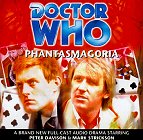 The Doctor and Turlough arrive in London, 1702, amidst a rash of disappearances, murders, and robberies. Well-to-do men have been vanishing without a trace, and the only connection anyone can draw between the victims is that they were last seen playing cards with the sinister and enigmatic Sir Nicholas Valentine at the Diabola Club. Turlough himself witnesses one of the horrifying disappearances and finds himself separated from the Doctor, and joins the intrepid Jasper Jeake as he tries to uncover the whereabouts of his friends. The Doctor befriends self-proclaimed occultist Dr. Samuel Holywell, who claims to have made contact with the dead – but the Doctor believes the explanation is simultaneously simpler and more complex than that. And largely unnoticed by the time travelers is the sudden transformation of a well-known robber into a murderer. At least two of these players are not from Earth – and even if the Doctor can discover who they are, the game is almost up.
The Doctor and Turlough arrive in London, 1702, amidst a rash of disappearances, murders, and robberies. Well-to-do men have been vanishing without a trace, and the only connection anyone can draw between the victims is that they were last seen playing cards with the sinister and enigmatic Sir Nicholas Valentine at the Diabola Club. Turlough himself witnesses one of the horrifying disappearances and finds himself separated from the Doctor, and joins the intrepid Jasper Jeake as he tries to uncover the whereabouts of his friends. The Doctor befriends self-proclaimed occultist Dr. Samuel Holywell, who claims to have made contact with the dead – but the Doctor believes the explanation is simultaneously simpler and more complex than that. And largely unnoticed by the time travelers is the sudden transformation of a well-known robber into a murderer. At least two of these players are not from Earth – and even if the Doctor can discover who they are, the game is almost up.
written by Mark Gatiss
directed by Nicholas Briggs
music by Alistair LockCast: Peter Davison (The Doctor), Mark Strickson (Turlough), David Walliams (Quincy Flowers), Jonathan Rigby (Edmund Carteret), Mark Gatiss (Jasper Jeake), Jez Fielder (Poltrot/Major Billy Lovemore), David Ryall (Sir Nicholas Valentine), Steven Wickham (Dr. Samuel Holywell), Julia Dalkin (Hannah Fry)
LogBook entry and TheatEar review by Earl Green
Review: Phantasmagoria fully justified my faith in the new Audio Adventures format, confirming my suspicion that the earlier Sirens Of Time suffered from the gimmickry-over-storytelling hex that has befallen multiple-Doctor adventures all the way back to 1973. Phantasmagoria is steeped in such Doctor Who staples as alien influence in the guise of black magic, SF elements in real historical environments, and the darkly moralistic high body count that resulted from other Davison-era adventures like Earthshock and Warriors Of The Deep, to name but a couple. If I were asked to give an idea of the story’s sheer atmosphere, I’d compare it to The Talons Of Weng-Chiang, though the story is very different. Phantasmagoria is true Davison-era Doctor Who at its best. I would love to have seen this story on the screen – and I’ve been hoping that the Audio Adventures would eventually give me that sentiment.
 It doesn’t hurt that Phantasmagoria utilizes one of my favorite Doctor-companion combinations. Peter Davison is in much better form as the fifth Doctor here than he was in Sirens, and though Mark Strickson’s voice is notably older than it was when he was a fresh-faced, early-twentysomething portraying Turlough on TV, his enthusiasm for the part compensates for that easily. The script even uses Turlough well, and in a form true to his television character’s better outings – he’s impetuous, not afraid to engage in a little bit of chivalry, but also not afraid to run like hell when faced with an unknown threat beyond his comprehension.
It doesn’t hurt that Phantasmagoria utilizes one of my favorite Doctor-companion combinations. Peter Davison is in much better form as the fifth Doctor here than he was in Sirens, and though Mark Strickson’s voice is notably older than it was when he was a fresh-faced, early-twentysomething portraying Turlough on TV, his enthusiasm for the part compensates for that easily. The script even uses Turlough well, and in a form true to his television character’s better outings – he’s impetuous, not afraid to engage in a little bit of chivalry, but also not afraid to run like hell when faced with an unknown threat beyond his comprehension.
The atmospheric story is helped by sound effects and music which are, again, a major improvement from the previous Audio Adventure. The supporting cast are also quite credible in their roles, and the script is rife with subtle humor, such as the scene in which Jasper Jeake, after being robbed by legendary scoundrel Major Billy Lovemore, remarks that the story of this encounter will be his meal ticket for years.
If you were nervous enough, given my previous review, to skip Sirens Of Time, I can heartily endorse Phantasmagoria to Doctor Who fans both casual and serious.
